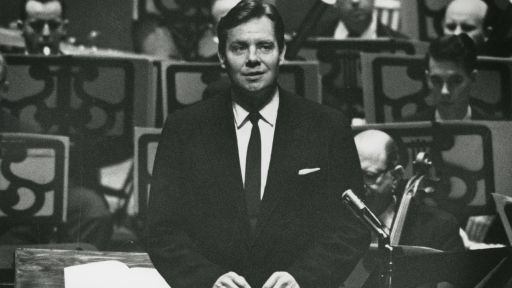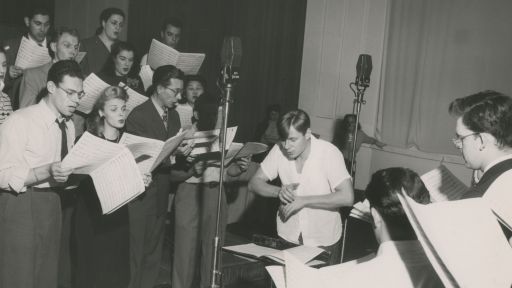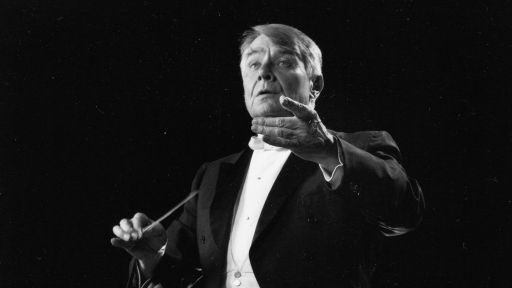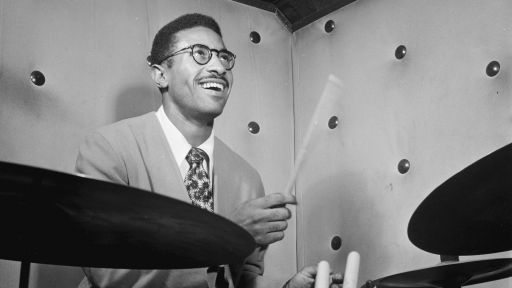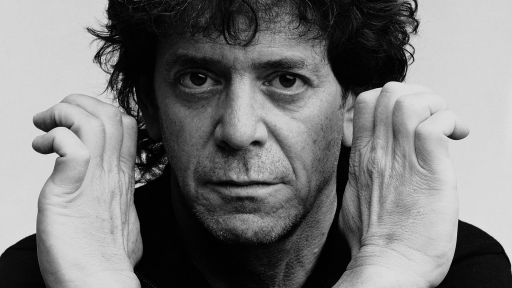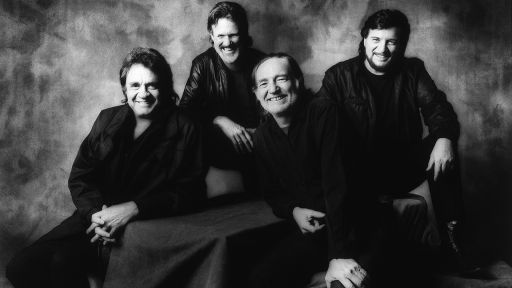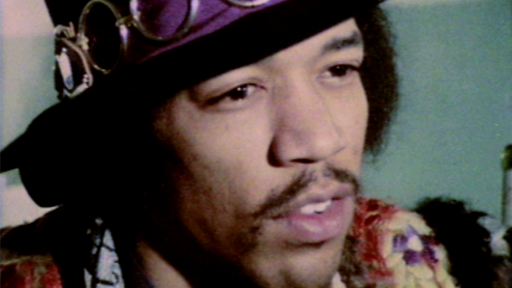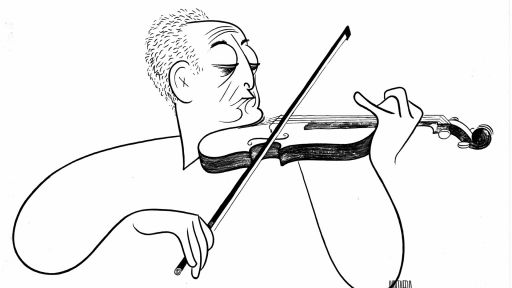TRANSCRIPT
♪♪♪ [ Choir singing ] Young: I don't think anybody starts out to be a genius. [laughs] They just start out doing something they love and they just capture everybody's imagination and that's the feeling you got when you were around Robert Shaw.
Ma: I think he held, in his head and heart and his soul, the keys to the kingdom.
David Hyde Pierce: Robert Shaw stunned America and the world with the sound he coaxed from the human voice.
Kopleff: I told him once, 'You know, you could me a rock sing.'
This charisma or this energy just flowed out of him.
Carter: He was totally in charge and totally dynamic.
Abbott: When he was in his element, there was nothing like it, that energy and the forcefulness of it all.
Woods: And his eyes could make an emotional connection with you that was deeper than anything I've ever experienced with another human being in my life.
Anderson: The level of performance, not only with choral music, but also orchestral music, is a level that we have seen in America.
McNair: He believed that the arts were able to reach across boundaries and heal racial wounds.
Goldsmith: He was able to combine this deep belief in the importance of the music with an equally sincere belief in the ability of all people to have their lives enriched.
He really believed in a democracy of the arts.
[ Outro plays ] [ Suspenseful music plays ] Pierce: A man of insatiable appetites and deep insecurities, Shaw could be his own worst enemy.
Kopleff: Oh, I think there's genius and, as with all genius, there is a monster.
Shaw: You misconstrue making music with making noise!
McNair: White-hot heat.
We were fascinated by it, drawn to it, terrified of it.
Jones: I can just see Robert Shaw, just angry and irascible and facing all the difficulties he faced and, yet, out of it comes this unbelievable music.
[ Choir singing 'Hallelujah' chorus ] Pierce: Shaw was self-taught, without formal musical training, but he became America's most celebrated choral conductor and would help build one of the world's great symphony orchestras.
Burris: This is a guy who is truly self-invented in the great American tradition.
Sullivan: This is the most distinguished conductor of chorale work in the country.
This is Robert Shaw.
[ Applause ] Burris: There was no previous Robert Shaw and there isn't gonna be another one.
Woman: Robert Shaw made us sing with one voice and the world stopped and listened.
Choir: ♪ Halle... ♪ ♪ ...lu... ♪ ♪ ...jah ♪ Choir 2: ♪ My god is a rock ♪ ♪ In a weary land ♪ Pierce: Robert Lawson Shaw grew up in a family that believed in changing lives.
Shaw: I come from a long line of ministers.
My father was a preacher and mother was perhaps the best-known singer of religious songs in the state of California.
Pierce: Shaw was the second of five children born to Evangelical Christians in the small town of Red Bluff, California.
Burris: They all sang.
They all led small church choirs, but none of them had much formal musical training.
Pierce: Shaw's mother doted on his younger brother Jim.
Burris: Jim was the shining star and then Robert was sort of the bad preacher's son, you know, that kid who was chewin' gum in church and throwin' spitballs from the balcony.
Pierce: As the oldest son, Shaw was expected to follow in his father's footsteps.
He filled in at the pulpit when his father was ill and studied religion at Pomona College.
Mussulman: He had a commanding tone of voice, so he'd say almost anything, and you believed it.
Choir: ♪ Hail Ponoma, hail ♪ Pierce: In 1937, the famous New York bandleader and radio star Fred Waring came to Pomona to film a musical comedy.
♪♪♪ While at Pomona, Waring heard Robert Shaw conduct the student glee club.
Parker: Waring could recognize right away that this was just extraordinary, the sounds that he was getting out of that chorus, and his intensity as he was leading it, which was unmistakable.
Kopleff: And Fred Waring asked him if he'd like to come to New York and help him form a men's chorus, which he had always wanted to add to his orchestra.
Mussulman: Robert Shaw already decided he was going to be a minister, and so he just brushed Fred Waring off and said, 'Thanks, but no thanks.'
[ Melancholy tune plays ] Pierce: The nation was gripped by the Great Depression.
Money was tight in the Shaw household and, when his father grew seriously ill, the family was plunged into debt.
Mussulman: So, he had a second thought.
He decided to call Waring and say, 'I'll take the job.'
What Shaw had in mind was that he would go for six months.
That would help him pay off some of the family's debts and then, he would go back and become a minister.
[ Upbeat vocals play ] ♪♪♪ Pierce: After traveling by bus from California to New Orleans, Shaw booked passage on a freighter and landed in New York in 1938.
♪♪♪ Anderson: When Shaw comes to New York City, it was a time of great vitality.
The big band movement was in full swing.
Pierce: Fred Waring had a nightly radio program on NBC.
Shaw: It was an exciting time to walk in and see all of these studios filled with music shows and comedy shows and variety shows and, of course, the NBC Symphony.
[ Choir humming ] Pierce: Shaw was soon conducting the new chorus he had created for Waring, doing 500 live shows a year for NBC.
He was 22 years old.
Man: The Chesterfield Swingerettes, Donna Dae, Daisy Bernier; with Bob Shaw and the whole gang.
Burris: Shaw was, at a very young age, with no musical training, on national radio.
♪♪♪ [ Melancholy tune plays ] Pierce: In 1939, Shaw met Maxine Farley, a fashionable young executive at Macy's.
After a whirlwind courtship, they married and moved to the upscale New York suburb of Scarsdale.
Maxine would soon be expecting their first child, but Shaw was often away from home, building a career.
Mussulman: Both of them were sincere in their respect for one another, but, he was gone so much and what had she to do with his life?
[ Birds chirping ] ♪♪♪ [ Suspenseful music plays ] [ Explosions ] Pierce: With World War II raging in Europe, the nation was in a serious mood and Shaw felt compelled to perform more than popular music.
Burris: This is a guy who hadn't even exposed to a lot of classical music and, yet, he knew he wanted something more than radio.
Shaw: Within a year, I'd formed the Collegiate Chorale, which was a large, nonprofessional, adult amateur chorus in New York City.
We auditioned something like 1,000 or 1,500 members and chose 200.
[ Poignant tune plays ] Pierce: The chorus was named for New York's Marble Collegiate Church, where it rehearsed.
The Collegiate Chorale would be something new and Shaw wrote an impassioned credo for the young musicians.
Shaw: We believe that, in a world of political, economic, and personal disintegrations, music is not a luxury, but a necessity.
We believe that music has always -- Pierce: Words were important to Robert Shaw.
He wrote a letter to the chorus nearly every week, a practice he would continue throughout his life.
Shaw: You don't join the Collegiate Chorale.
You it.
It's very damn near a religion.
It's a way of life.
Jones: He would leave a rehearsal, go home, and write those letters in the kind of heat of the moment.
There was never a careless word.
He intended every word that he wrote.
Parker: Mr. Shaw talked about the kind of morality of singing the right vowel at the right time and of the to the composer's vision and the It was very theological language.
[ Choir singing ] ♪♪♪ Pierce: The Collegiate Chorale became a great success and Shaw insisted on the best singers, regardless of ethnic or racial backgrounds.
Simpson: When people sing together, they lose the sense of difference.
When you're singing next to a soprano from a different neighborhood, all that matters is that you're singing something together and your hearts are coming together.
Pierce: Collegiate Church's pastor, Norman Vincent Peale, the best-selling author of 'The Power of Positive Thinking,' objected to Shaw's integrated chorus.
Kopleff: And he eventually decided that we were not good for his church.
He wanted it to have no Blacks, no Jews, no Catholics, and Mr. Shaw was not very happy with that, so we up and left.
Pierce: This was the first time Shaw encountered discrimination in his career.
It would not be the last.
♪♪♪ [ Suspenseful music plays ] [ Explosion ] On December 7, 1941, Japan bombed Pearl Harbor and America entered the war.
While hundreds of thousands of men signed up to fight, Shaw obtained conscientious objector status and performed alternative service.
Goldsmith: That was a position that was far outside the norm.
World War II was the good war and everybody was expected to enlist and be a part of the war effort [ Melancholy tune plays ] and Mr. Shaw did not.
Shaw: I formed a violent disaffection for war when I was in my late teens and, for a long time, I'd been flirting, intellectually and morally, and emotionally, with pacifism.
Pierce: Shaw would wage war, he said, 'Not with weapons, but with music.'
By 1942, Shaw was at Carnegie Hall, raising money for war bonds with Orson Welles [ Applause ] and Charlie Chaplin.
He soon began recording for RCA Records and was recruited by impresario Billy Rose to conduct the chorus of the Broadway musical 'Carmen Jones,' with lyrics by Oscar Hammerstein.
He was 26 years old.
Jones: Robert Shaw was Nobody could get near enough to him.
Nobody could have enough of him.
Nobody could extract from him whatever the magic was, and they all wanted a piece of it, and, of course, they all wanted a piece of him, too.
Pierce: While Shaw lived the high life in the city, [ Melancholy tune plays ] his home life deteriorated.
Parker: Maxine was a wonderful woman, intelligent.
She tried as hard as she could to make it work, but he was not good to her.
Jones: He would spend his nights in an office in New York and send the laundry home to Maxine.
It was very manipulative and I would say, without overstating, that he her.
Alex: Robert got famous when he was 22 years old and he was fawned over and he was coddled and there was a portion of his psyche, of his development, that never changed past age 22, so he could be very immature.
Pierce: Shaw's parents questioned the glamorous life he was leading in New York.
Parker: If he'd been a minister, that would've been the right thing for him to be.
Anything else wasn't good enough.
Pierce: Shaw's brother Jim did become a minister and served as an Air Force chaplain in the South Pacific.
Burris: Jim was viewed by the family, including Robert, as the star.
He was personable.
He was good at business, and then, it turned out, he was a great chaplain.
[ Dirge plays ] Pierce: On July 30, 1944, the day before he was to return to America from New Guinea, Jim Shaw was leading his last service as Japanese bombers approached.
Shaw: My brother was an Air Force chaplain and he was killed in a bombing on his church at Biak Island in the South Pacific.
♪♪♪ Pierce: When Shaw heard of his brother's death, he withdrew his declaration as a conscientious objector and returned to California to mourn with his family.
Frink: It was at a time when Shaw was drinking rather heavily and his mother said to him, 'That should have been you, Robert,' and I think that set the tone for the rest of his life.
From then on, he was giving back and atoning for a youth not lived so well.
Burris: And I think that hurt, that wound, was with him always.
[ Melancholy chorale plays ] ♪♪♪ Shaw: Dear Fred, I have felt musically ill-at-ease, insecure, and unhappy.
[ Clock ticking ] And, while I'm not ready to step into the symphonic world as a schooled musician, I know the way I must go and the music with which I work.
Goldsmith: He wrote a letter to Fred Waring, saying, in effect, 'I can't do your kind of music anymore.
I've got to follow the path of Bach and Brahms and Mozart.'
He became a more serious man after the death of his brother.
[ Piano plays somber tune ] ♪♪♪ Shaw: I read a score with difficulty.
I don't have keyboard skills and so it's a real chore to learn a new major work.
McNair: When he was studying a score, he would have to sit at the piano in his studio with one finger; at the most, three or four fingers, slowly, very carefully, trying to play on the keyboard the score that was in front of him.
Parker: He just worked like as if he had a responsibility to that itch that was in him to get to this music.
Jones: He said, 'My entire life has been a makeup lesson,' because he didn't get lessons in voice.
He didn't get lessons in piano.
He really just acquired his skills as an amateur and, pretty soon, he was in no amateur world.
Pierce: The journey from popular to classical music was painfully difficult and Shaw got his share of bad reviews from doubting critics.
Parker: They were so hard on him.
There was a good review.
'The man has been with Fred Waring for years.
Why on Earth would he presume to come and foist this 'Requiem' on us?
He's not a conductor of serious music.'
Anderson: People associate Shaw with popular music, so, this has been both a blessing and a curse [chuckle] because the tradition of orchestral conduction doesn't come that way.
♪♪♪ Pierce: Arturo Toscanini, the greatest conductor of his time, knew talent when he saw it.
He insisted that Robert Shaw prepare the Collegiate Chorale in a performance of Beethoven's '9th Symphony' with the NBC Symphony Orchestra.
♪♪♪ [ Choir singing ] ♪♪♪ Mussulman: Toscanini said to Shaw, on one occasion, that he had never conducted a really satisfactory performance of Beethoven's '9th.'
'Sometimes, the orchestra is bad,' he said.
'Sometimes the chorus is bad.
Sometimes am terrible.'
♪♪♪ Pierce: But when Toscanini auditioned Shaw, he declared, 'Finally, I have found the maestro I have been looking for.'
♪♪♪ ♪♪♪ ♪♪♪ [ Cheering and applause ] Goldsmith: And, in a televised production of the '9th' symphony, at the end, amid all of the applause and ovations from the audience, Toscanini went backstage and onto the stage, to accept a bow, the young Robert Shaw and there's Mr. Shaw in embarrassment, as Toscanini is saying, 'Let us give this young man his due.'
Anderson: Toscanini recognized his ability said that Shaw would be his successor as a conductor.
He didn't qualify and say his successor as a choral conductor.
He said, 'He would be my successor as a conductor.'
Toscanini, certainly one of the greatest conductors the world have ever seen.
Burris: He found in Toscanini this kind of father figure and there's no question that there's no one he admired more, looked up to more.
Pierce: Shaw and Toscanini became lifelong friends and made many recordings together.
The fiery Italian conductor always called Shaw 'Maestro.'
♪♪♪ Choir: ♪ Oh, Susanna! ♪ Pierce: By the late 1940s, Shaw had created a small group of professional singers, the Robert Shaw Chorale, that would tour America and, later, the world.
Kopleff: He believed in doing good music well and taking it to the people.
We've taken the Mozart 'Requiem,' the B minor, to places where people never heard it before.
Choir: ♪ Oh, Susanna ♪ ♪ Oh, don't you cry for me ♪ Goldsmith: It's really one of the amazing images: the Robert Shaw Chorale in its bus, traveling hundreds of miles during a day, to Sioux Falls, South Dakota; or Bartlesville, Oklahoma, and filling up the high school auditorium where they played.
Jones: This is high school gym, high school little theater.
They had to create performance halls out of everywhere they went.
Goldsmith: And then, breaking down the equipment after the concert, getting back into the bus, and heading on to their next appointment and traveling 2,000, 3,000 miles in a week.
Choir: ♪ On my knee ♪ ♪ What wondrous love ♪ ♪ Is this? ♪ ♪ O my soul! ♪ ♪ O my soul! ♪ ♪ What wondrous love is this? ♪ ♪ O my soul! ♪ McNair: Music really became Mr. Shaw's mission field and I think the audience became the people he needed to convert.
You could take Mr. Shaw out of the ministry, but you couldn't take the ministry out of Mr. Shaw.
Sullivan: This is Robert Shaw, so let's have a very nice hand for him, would you?
Robert, great to have you on the show.
[ Applause ] What are you gonna do for us now?
Shaw: I'm gonna do a Negro spiritual called 'Set Down, Servant.'
Sullivan: Take it.
[ Clapping rhythmically ] ♪ Set down, servant ♪ ♪ I can't set down ♪ ♪ Set down, servant ♪ ♪ I can't set down ♪ ♪ Set down, servant ♪ Pierce: Nearly every concert of the Robert Shaw Chorale included a spiritual.
Anderson: All of Shaw's life, the Negro spirituals have been very important.
What he saw in folk music, in general, was a sense of community that transpires between the listener and the performer, so Shaw understood that well.
♪ My soul is so happy ♪ ♪ That I can't set ♪ ♪ Down ♪ [ Applause ] Sullivan: Bravo.
[ Applause continues ] Let's hear it for Robert Shaw and his chorale.
[ Choir singing ] Pierce: In just five years, the Robert Shaw Chorale would make 35 records and become a household name in America.
♪♪♪ Shaw's album 'Christmas Hymns and Carols,' was the first certified gold record by a classical artist.
Choir: ♪ All my love ♪ Goldsmith: And it just was not Christmas until my father would get the Robert Shaw record out of the sleeve, put it on our old turntable, and it magically became Christmas.
♪♪♪ Pierce: Shaw himself had little time to celebrate Christmas.
Recording and touring nonstop, he was everywhere but at home.
Alex: That family was so neglected and he had such an incurable guilt [ Melancholy tune plays ] over his three children.
Mussulman: He was ashamed of the fact that he couldn't be at home at the children's bedtime, so he recorded these two stories from Winnie the Pooh just for them.
Shaw: Now, sit down.
I'm gonna tell you a story and it's called 'In which a House is built at Pooh Corner for Eeyore.'
Now, one day when Pooh Bear had nothing -- Pierce: But the rift between Shaw and his family continued to grow deeper.
Alex: He was...philandering.
He was traveling.
He was interested in anything but what he referred to as 'playing Daddy.'
Pierce: Shaw's attraction to women chorus members was an open secret.
Parker: We would often, in the years that went by, enjoy watching his relationship with the new girls that came into the chorale because there would be one that would catch his eye and we would say, 'Ooh, here's the next one.'
Pierce: Maxine knew about his affairs, but did not leave him.
Shaw became a heavy drinker.
Sealed in their misery, they would remain unhappily married.
♪♪♪ [ Playing Beethoven's '5th Symphony' ] Burris: Shaw was on the high wire at each stage of his career and, of course, the most risk-taking thing was probably going to Cleveland to work with George Szell, the most knowledge conductor in the world.
Shaw: George Szell asked me to come to the Cleveland Orchestra, which was then the really great orchestra in the United States.
Pierce: In 1957, Shaw was appointed assistant conductor of the Cleveland Orchestra, serving under its masterful director, George Szell.
Szell wanted the magic he thought only Robert Shaw could bring with the chorus.
Shaw craved Szell's command of the orchestra and his vast musical knowledge.
Shaw: I think it's very possible that he could've played all the Mozart symphonies and certainly all the Beethovens and Brahms symphonies and Schumann symphonies from memory at the keyboard.
Szell: The phrasing.
♪♪♪ Pierce: Before coming to Cleveland, Shaw had never conducted a major orchestra.
Burris: And that meant to conduct pieces that he'd never heard, not to mention pieces that he never studied, so he repeatedly, in his life, threw himself into impossible situations.
Pierce: Szell and Shaw were temperamental opposites.
Szell was controlling and authoritarian.
Shaw was emotional and intuitive.
Szell: Two punto fortissimos back from the double bar.
Shaw: We were antagonistic reasonably early.
I should've learned from him an awful lot more than I did.
Woods: Szell was tough on him.
It had to be a really quite miserable existence for Robert Shaw, except for what he got out of it, and you couldn't not be disciplined and be around George Szell.
He'd eat you alive.
Men: ♪ I've got shoes and you've got shoes and ♪ ♪ I've got shoes ♪ Women: ♪ You've got shoes ♪ ♪ All of God's children got shoes ♪ Pierce: Shaw faced other challenges during his years in Cleveland.
In the 1960s, he made three trips to the American South with the integrated Robert Shaw Chorale.
Shaw: We were, very frankly, the first group that mixed Blacks and whites on stages in the South.
There were a lot of mayors that didn't know we integrated their hotels, too.
Parker: To fight those battles, to say, 'No, we will not stay in that hotel, if we cannot all stay in that hotel.'
Choir: ♪ I'm gonna play ♪ ♪ All over God's heaven ♪ Parker: 'No, we will not perform in the big concert hall, if Blacks are not permitted to sit with whites in that concert hall.'
This was Kopleff: And there were times when we drove down South and stopped for lunch.
There was no place for them to eat, so the rest of us would go in the grocery stores and buy bread and cold cuts and fruit and we'd all eat in the bus.
[ Handel's 'Messiah' plays ] Pierce: A concert took place on Easter Sunday in Birmingham, Alabama, at a time when the city was embroiled in some of the nation's bitterest civil rights struggles.
♪♪♪ The program was Handel's 'Messiah,' with soloists Seth McCoy and Lorna Haywood.
Haywood: And the people in the front rows, when they saw Seth come out and sit next to me on the platform, were outraged.
They were outraged.
Shaw: In the South, we had the front three rows, which were the expensive rows, get up and leave as our group walked onstage.
Mussulman: After the overture, they started the recitative, 'Comfort Ye, My People.'
♪♪♪ McCoy: ♪ Comfort ♪ ♪ Ye ♪ Mussulman: Seth McCoy sang that and dissolved everybody into tears.
♪♪♪ McCoy: ♪ Comfort ♪ ♪ Ye ♪ ♪ My people ♪ Pierce: Once the music had begun, Handel's 'Messiah' was performed without incident.
Shaw: We never canceled a concert or we never changed personnel.
In some respects, we led that crusade in the arts.
[ Crickets chirping ] McCoy: ♪ Ye ♪ [ Suspenseful music plays ] Pierce: On June 3, 1962, a charter flight carrying 106 Atlanta arts patrons crashed while departing from Orly Airport in Paris.
The heart of Atlanta's arts community was gone.
Reporter: A shocked and saddened city is planning memorial services for more than 100 of its citizens, killed in the crash of a giant jet airliner in France yesterday.
Head: Mayor Ivan Allen flew to Orly Field in France and accompanied the bodies back home here.
The decision was made that they were going to do something to memorialize this loss.
Pierce: City leaders committed to building a new symphony hall.
Now, all they needed was a new music director.
King: Let freedom ring from Stone Mountain of Georgia.
[ Cheering and applause ] Shaw: I came to Atlanta, I suppose, partly, because Martin Luther King was here.
Carter: One of the reasons that Robert Shaw chose Atlanta to expand his breadth of service as a conductor of a major symphony orchestra was because of Atlanta's positive record on that civil rights issue and this was not a popular thing to do, back in those days, when you made that choice, so when he came to Atlanta, I was overjoyed.
Pierce: After nearly 10 years of learning from George Szell, Shaw was ready to lead his own orchestra.
Burris: He knew he wanted to build from scratch and I think he actually liked the idea of being sort of off the map.
Pierce: Shaw left the world-renowned Cleveland Orchestra to assume the helm of a regional symphony operating with part-time musicians and a modest budget.
Head: We had no home.
We rehearsed wherever we could find a place.
We rehearsed at Spring Street School.
We rehearsed a full year in the locker room of the Braves, [laughing] so.
♪♪♪ Pierce: As Atlanta built a new home for the orchestra, Shaw was scouring the country for top musicians.
Burris: Shaw went after players who were playing with the Minnesota Orchestra, the Philadelphia Orchestra.
I mean, he went after really great players 'cause it was the only way to quickly lift up the quality of the orchestra and that meant he had to have some money.
Pierce: Shaw proved to be a great fundraiser, even if the money came from his own pocket.
Head: He would give money to people to buy instruments.
He would give money to people to maybe study some more.
Pierce: When a strike loomed in a contract dispute between players and management, Shaw offered a solution.
Head: He told the president of the board of sponsors, 'Are we exactly $150,000 shy?'
And they said, 'Yes.'
He said, 'Well, then, take my salary and I'll conduct for nothing this year, but let's get the orchestra back on stage.'
Shaw: Within a very few years, that orchestra grew from a budget of $250,000 in 20 weeks a year, to 52 weeks a year and a budget approaching $15 million, $20 million.
Ardan: I think that the orchestra was excited to be evolving into a great orchestra.
Shaw was fighting for great conditions and not overplaying, things that would help us do what we did best.
Haywood: He didn't ask you for more than he himself was giving, which was 200%. Incredible passion for the music, incredible energy.
Woods: What was Shaw's preparation process for any performance?
I would say it would be Preparation H for me, [laughing] if I worked that hard.
McNair: And even after he had done a piece 100 performances, he would still go back to the drawing board and almost start from scratch.
Woods: I've never seen anybody who meticulously worked his way through a score than Robert Shaw did and he did it because he felt he had to.
Head: My observations of Robert Shaw were one of incredible intellect, but also a person with some insecurities about his performance.
Ardan: He didn't have the training that a lot of the great conductors had had and so he was very insecure about telling people how to play their instruments, whereas, with the chorus, he could say it so concisely.
Shaw: I don't think I've ever learned quite enough, so I invited criticisms and suggestions from principal players.
Thomas: The humility itself was genuine because I think what drove him to work so hard was a ceaseless feeling of unworthiness to the task at hand.
Burris: That insecurity was also the humility, so the thing that made him this servant of music and made him, in many ways, a great conductor.
[ Applause ] [ Outro plays ] [ Choir singing ] Pierce: On April 4, 1968, Martin Luther King Jr. was killed, setting off months of racial and social unrest.
♪♪♪ That winter, Robert Shaw invited the glee club from Atlanta's historically Black Morehouse College to perform a Christmas concert with the Atlanta Symphony Orchestra.
♪♪♪ Brown: I believe Mr. Shaw felt genuinely this was an opportunity for the Atlanta Symphony and for him to begin helping the healing and building of the relationship of civil and human rights.
Epps: I can remember the pride of African Americans in Atlanta when Mr. Shaw announced that T.J. Anderson would be the first African American composer to residence with the Atlanta Symphony.
Anderson: In fact, he championed not only African American composers.
He championed American composers, in general.
I think the issue is really not race, but music, with Shaw.
Young: He understood that art was the frontier of a society and that artists thrived by taking risks and, even it were not Black and white, this should be an American music that's different from the classical European music.
[ Suspenseful music plays ] Goldsmith: He commissioned new pieces.
He performed new pieces and, when he came to Atlanta, it was very much incumbent upon him, he thought, to present new music to his audiences.
Shaw: The thing that I'm convinced about is that, [laughing] if you don't play your own century's music, nobody's gonna get a chance to hear it and decide about it.
Burris: There was that side to Shaw that, you know, you should eat your turnips; this'll be good for ya and people in Atlanta wanted to hear Romantic music, music that they knew.
Head: Every concert had a Charles Ives piece on it.
I mean, not only was the orchestra just, 'Oh, please, not another Charles Ives,' but the audience was really dwindling fast.
Ticket sales were terrible.
Burris: He said, 'People should hear the music of their time,' and that was enormously unpopular in Atlanta and got him fired.
[ Suspenseful music climbs ] Reporter: Did Robert Shaw, director of the Atlanta Symphony, resign or was he, in effect, fired?
Mr. Shaw, music director here for five years, was recently informed by the symphony board's executive committee that his contract would not be renewed.
Shaw: I'm saying that the management is inadequate and that the administration is without focus of principle.
Pierce: A grassroots movement arose to keep Shaw in Atlanta.
Woman: We're asking everyone who was enjoyed the concerts with Robert Shaw to send a check for $20 as a deposit on next year's season tickets.
Anderson: They went around and advocated that people subscribing to the Atlanta Symphony make checks out to Robert Shaw the Atlanta Symphony, so, therefore, you couldn't cash the checks unless Robert Shaw was the conductor.
Man: We've sold over 1,000 season ticket seats in the last two days.
Shaw: The question is whether artistic administration and artistic principles are to direct economic development or whether economic development is to direct artistic principles.
♪♪♪ Pierce: Bowing to community pressure, the board of the Atlanta Symphony Orchestra rehired Shaw as music director.
♪♪♪ Shaw had won the support of his community, but his marriage had come to an end.
[ Clock ticking ] Taking their three children, Maxine moved to Nantucket Island, leaving Shaw alone and struggling.
Anderson: Shaw was actually drinking quite a bit, womanizing quite a bit, and, of course, any famous person attracts.
Burris: Those early years in Atlanta were really tough, including the firing, but not just the firing.
It was a lot of storming out of chorus rehearsals.
[ Choir singing ] Shaw: [Humming] Once again, ready, sing.
[ Choir singing ] No! You think, because you've been raised all your life hearing bad rhythm, that you can get away with it in great music, and you can't.
I mean, that's good enough for 'How Great Thou Art' and for the 'Lord's Prayer.'
If you're singin' that cheap, shoddy music, that's fine, but, when you're singin' great music, then it's gotta be right.
Clean.
Kopleff: He could be a... You could get absolutely with him.
One little mistake is not gonna kill a performance, but to him, it was, 'You have killed Bach.'
He couldn't control himself at times like that.
Alex: Nobody ever used the word manic-depressive, but that's certainly what he was, and alcoholic, and he did his very best to keep himself in the road, but there's a genius mentality that doesn't always allow you to be a normal person with a normal life.
Woods: He could beat you up and kick you in the gutter... [ Laughing ] [ Duo singing ] ...but he'd make up for it with something that so inspired you, so made you feel loved... Shaw: [Smooch] [ Laughter ] Woods: ...that you didn't remember or care about the rest of it.
[ Applause ] Pierce: Caroline Hitz was a symphony board director who had worked to save Shaw's job.
When Shaw heard of her divorce, he wasted no time.
Hitz: He knows what he wants and he goes [laughing] after it and so it was very romantic, I must say.
Jones: He would come over and mow her grass and I can't imagine looking up from my breakfast coffee and seeing Robert Shaw mowing my grass, but, you know, there it was.
Hitz: It was just like Tarzan and Jane, you know?
[ Laughter ] Oh, he just told me that, you know, this is the way things were gonna be, and that was it.
Jones: Caroline probably saved Robert Shaw's life because she rescued him from himself.
Shaw: The amount of love and affection that's been developed in this home situation, I had no idea that home was a place to go home to.
[ Birds chirping ] [ Laughing delightedly ] Pierce: Shaw and Caroline married in 1973.
He helped raise her son Alex and became a father again at 60 when Thomas was born.
Shaw: Good to have the responsibility of the two children and finally become a father after three failures.
It's made an extraordinary difference in my whole capacity to help other people.
[ Tender outro plays ] [ Suspenseful chord strikes ] Pierce: In 1978, Shaw and the Atlanta Symphony Orchestra introduced a new technology, recording the first digital classical album.
He chose Stravinsky's 'Firebird Suite,' an all-orchestral piece, and his recordings with Telarc Records would go on to win 16 Grammy awards.
Woods: Still astounds me, to this day, how fantastic that performance is, and that I love that the first thing that we did with Shaw was orchestral music.
Spano: In the end, Shaw was no longer a choral conductor, despite the fact he was still the grand master of the choral world.
He was a great conductor, by any measure.
♪♪♪ [ Choir singing ] Pierce: Behind the scenes, Shaw still had a difficult relationship with the Atlanta Symphony Orchestra board.
Burris: Shaw kept challenging them, kept having tempter tantrums, kept threatening to quit and move on.
[ Applause ] Pierce: In 1988, the board felt it was, again, time to make a change.
Currey: Mr. Shaw was, at that point, getting old, so I was deputized to talk to him about becoming music director emeritus and conductor laureate or some half-long title like that.
♪♪♪ Pierce: Shaw reluctantly accepted the board's offer.
His last act as music director was to take the Atlanta Symphony Orchestra and Chorus on a European tour.
The first stop on the tour was Communist East Berlin, a city divided by the Cold War.
Abbott: I think we were all on edge.
Going into East Berlin was not anything most of us had experienced.
Jones: The wall was still up and the whole of East Berlin was a kind of a ghost town.
Head: So we go to Checkpoint Charlie.
These soldiers, Gestapo-type, come out with mirrors under the bus, to see if there's anybody hanging on under the bus to escape.
They took our passports, which, I didn't feel real good about that.
Abbott: But we got there and, of course, the Schauspielhaus was magnificent: ornate and DeBold: And we performed a concert on a Monday at 5:00 in the afternoon, an odd time for a concert.
It was a packed concert hall and we got to perform the Beethoven '9th.'
[ Playing 'Ode to Joy' ] ♪♪♪ Head: We proceed to go through the first, second, and third movements of the '9th' and we get to the fourth movement.
The orchestra is wonderful, everything.
Shaw's in heaven, I think, and I just glanced over to the side [crying] and these elderly, 70-, 80-year-old Germans who experienced World War II were just uncontrollably sobbing.
I mean, tears.
I said to myself, 'I have to look away.
If I see this, I won't be able to play a note.'
Choir: ♪ ♪ ♪ ♪ ♪ ♪ DeBold: And I remember standing up there with my fellow altos and weeping.
Not just me.
My fellow singers were weeping.
The audience was weeping.
Abbott: That's when the humanity of us versus them vanished and it was such a sense of coming together, regardless of what the politicians said.
You could not keep us from that.
♪♪♪ Jones: We made a sound. It gives me the shivers right now, just thinking about it.
I don't think we nor did we think we were capable of it.
[ Choir singing in German ] ♪♪♪ ♪♪♪ ♪♪♪ [ Applause ] Preucil: [crying] We were received by the audience in a very special way.
Their applause and thanks was lasting very long and then, what normally happened is is the audience would give up and stop clapping and go home.
Um -- They didn't.
Head: [crying] It was just unreal.
Never experienced anything like it in my life, and haven't since.
DeBold: He had to actually take the orchestra and the chorus offstage, and they still wouldn't let him leave.
Head: Went downstairs, changed clothes.
Went upstairs.
He was walking out to the empty stage.
They literally wouldn't let him go, so, talk about an ambassador for this country.
He was that.
[ Choir singing ] Runnicles: He was a deeply spiritual man and a man who could not understand why there were conflicts, why there was strife in the world and used his art to build bridges to bring people together.
Shaw: The arts are an international language.
They are the things which bind people together at their own eventual best, their own eventual goodness, and so they belong on the vastest possible human platform that man can conceive.
♪♪♪ [ Suspenseful music plays ] Pierce: After the European tour, Shaw stepped down as music director of the Atlanta Symphony Orchestra.
At 72, a new career was about to begin.
He would guest conduct the nation's greatest orchestras and lead annual workshops and performances at Carnegie Hall, with America's finest musicians.
Shaw: And, uh, one.
♪ And the soul ♪ ♪ And the soul ♪ And. [clapping] And the One, two, three, one.
♪ And the soul ♪ ♪ And the soul ♪ No, no, no! There's no intensity on the quarter notes!
And piano is more and more energy gathered into less and less sound and you make it weaker and weaker and weaker instead of more [tapping] and more and more, until it becomes too important to sing loudly about.
You can only sing quietly because you mean it so much.
[ Choir singing ] ♪♪♪ [ Indistinct ] ♪♪♪ Da! On the downbeat.
Singin' a piece like this changes lives.
Goddamn it, [clapping] it changes lives.
You don't think the same anymore.
You don't cry over the same things.
You don't love the same way.
You're different and it's just too damn bad that humanity isn't ready for it.
But our problem is to change, you know, not singers, but to change society.
[ Melancholy tune plays ] Pierce: A few days after the workshop, Shaw's beloved Caroline died of cancer.
♪♪♪ Alex: She's the one who really set him on a different stage of his life, who made him into the artist that he was always meant to become, and, for four solid years, he did not have one happy day, not one.
He did some of the very best work of his career.
[ Applause ] He honored her in a way that was manifold, profound.
He loved her so much.
Pierce: In January 1999, Shaw attended a play directed by their son Thomas, who was studying theater at Yale University.
In poor health, Shaw was accompanied by his longtime assistant, Nola Frink.
Frink: He knew he was quite ill at that time and his doctor had said something like, 'Well, whatever's gonna happen is gonna happen wherever you are. Where do you want to be?'
He said, 'I want to be with my son.'
Pierce: Shaw knew that the play was 'Endgame,' by Samuel Beckett.
Frink: And he looked at me at one point and said, 'You know, tonight is all about death,' and the play was that, you know, it really was.
Thomas: It was a very small theater, maybe 50 or 60 seats.
He was just in the audience, like, snoring, what I thought was snoring.
Frink: I knew this was not sleep because I tried to rouse him and I was seated right next to him and I said, 'Something's wrong here.'
Thomas: And that was like -- I was pissed 'cause I thought he had gone to sleep, you know, and, uh -- um -- [ Choir singing ] ♪♪♪ Pierce: Robert Shaw died of a massive stroke on January 25, 1999.
He had recently recorded Dvorak's 'Stabat Mater,' a piece he had never performed before, and was working on an English translation of the Brahms 'Requiem.'
Until the moment of his death at 82, Robert Shaw had a deep reverence and passion for music.
Jones: I think he was daring.
Oh, my gosh!
He had projects lined up for Carnegie Hall until 2020.
What remarkable ability to imagine what could still happen.
♪♪♪ Alex: It's hard not to talk about Robert without acknowledging his courage and his fearlessness.
If you touch one person, then that's enough, and think about all of the people's lives that he touched.
Simpson: When he took me under his wing, I felt a responsibility to, not only him, [crying] but a greater sense of responsibility to my community to represent the people who had come before me, and I think I'll always be indebted to him for that.
Spano: I think Shaw's pro-civil rights stance is so much in keeping with the larger character of his life's work, which has so much to do with the importance of music in society.
Our artistic life is as necessary for our humanity as food and water and air.
He lived that.
Woods: He was a very powerful man.
Sometimes, he blew a gasket and sometimes, the lovefest was so grand that people would be in tears and I've experienced it with anybody else, Carter: He was totally in charge and totally dynamic and expressed his inner feelings on that stage with his other performers in a way that really brought sometimes cheers and sometimes tears to the audience.
Ma: Not only was Robert Shaw a great musician, a great conductor, a great choral director, but the way that you could make something that is meaningful to you meaningful to somebody else.
He had that. -Shaw: Use all the sound -- DeBold: He would talk to us like we were one person, this 200-voice chorus.
I think he had a vision that the music could lead people to a better place, to overcome hardships by listening to music or participating in it.
He often said that a person might be hearing a piece of music for the first time at a concert, but there's somebody else who might be hearing it for the last.
He was a brilliant man, a brilliant man.
♪♪♪ Shaw: I think the arts are sort of the last residence of personal integrity, that they have a lot to say about the fellowship of human beings and people who make music together ultimately end up respecting one another.
This builds a humility and a tolerance of other human beings that I think is essential to a civilization.
[ Applause ] ♪♪♪ -♪ Hallelujah ♪ ♪ Hallelujah ♪ ♪ Hallelujah, hallelujah, Halle-e-lu-jah ♪ And He shall reign forever and ever -To order 'American Masters Robert Shaw: Man of Many Voices' visit, ShopPBS, or call 1-800-PLAY-PBS.
This program is also available on Amazon Prime Video.
-♪ Halle-e-lu-jah ♪ [ Cheers and applause ]

